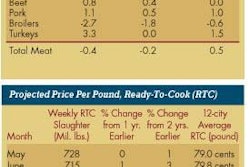The world's turkey industry has grown dramatically over the past few decades. Between 1970 and 2007, annual world turkey meat production grew from 1,224 million metric tons (MT) to 5,102 million MT, an increase of 317 percent. Brazil was not ranked among the top 10 turkey producing countries in 1970. It was first listed in the top 10 in 1990, with 53,000 MT produced, equivalent to 1.4 percent of world production. In 2007, Brazil produced 458,000 MT of turkey meat, or 7.45 percent of world production, according to UBA, the Brazilian Poultry Industry Association. Brazil ranked as the third largest turkey producing country/region in 2007, ranking behind only the U.S. and the EU-27, according to USDA FAS.
Turkey meat production in Brazil is done by divisions of major broiler processing companies. Sadia, the leading Brazilian food conglomerate, pioneered turkey production in Brazil in 1967. Sadia lost its market exclusivity from 2000 when first, Perdigão, and then, later, Doux-Frangosul, local arm of the French giant Doux, began raising and processing turkeys.
Only three U.S. turkey companies, Butterball LLC, Jennie-O Turkey Store, and Cargill Value Added Meats, processed more head of turkeys than Sadia and Perdigão did in 2007.
Per capita turkey meat consumption in Brazil has increased from a paltry 1.1 pounds (0.5 kg) in 2000 to 2.42 pounds (1.1 kg) in 2007.
According to UBA, this figure, even though very modest, gives Brazilian consumers the fifth highest per capita turkey meat consumption, behind Mexico, 4.18 pounds (1.9 kg); EU-25, 9.46 pounds (4.3 kg); Canada, 9.68 pounds (4.4 kg); and, the U.S., 16.7 pounds (7.6 kg). Furthermore, over the past five years the variety of turkey meat-based products available at Brazilian grocery stores increased significantly. Also, a large number of restaurants have been adding turkey meat-based dishes to their menus.
Global turkey meat trade has increased dramatically since 1970, when just 18,206 MT were traded. In 2007, world turkey meat exports reached 554,000 MT. Only four turkey exporting countries/regions are worth noting: the U.S., Brazil, EU and Canada. Brazil's market share jumped from 7.86 percent of the global exports, in 2000, to 29.4 percent, in 2007, a growth of 272 percent. In the same period, the U.S. increased its market share by 25.62 percent; the EU, the former leading exporting block, reduced its participation by almost 55 percent, reducing from 44.29 percent to 19.86 percent, respectively.
The majority of the Brazilian turkey meat exports head to the EU, the second largest world importer, and most of this goes to Germany and Spain. Mexico is the world's largest importer of turkey meat. Brazilian poultry products, including turkey meat, are not allowed to be imported into North America, because of the current sanitary restrictions imposed on Brazilian products by the NAFTA guidelines.
The outlook for the Brazilian turkey industry is quite favorable. USDA FAS forecasts Brazilian turkey production to increase by 10 percent this year, supported by strong domestic demand. In the domestic market, economic growth of nearly 5 percent or slightly more for 2008, allied to a lower unemployment rate, and higher disposable income, will likely contribute to maintain firm domestic demand for turkey. In addition, some investment projects to increase turkey production have matured and production is now reaching the market. Most of the increased domestic demand for turkey meat in Brazil comes from the foodservice industry. Frozen ready-to-cook turkey consumption will remain highly seasonal. Processed turkey products are consumed throughout the year.
The future looks bright for the Brazilian turkey industry. By gaining ground in the domestic market, turkey meat will likely help to diversify and enrich the Brazilians' diet and improve the industry's performance. Increasing its share of turkey export markets will consolidate Brazil's leadership as a poultry meat exporter.





.jpg?auto=format%2Ccompress&fit=crop&h=167&q=70&w=250)











